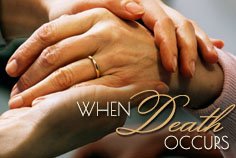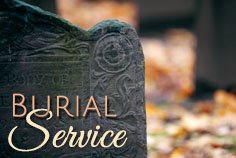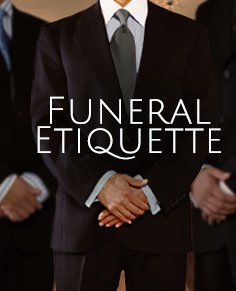Funeral Service Options
Family and friends getting together to honor a loved one’s life is one of the most important steps in the grieving and healing process. You may opt to have a traditional religious or military service, or as more and more people are doing, you can choose to have a non-traditional ‘celebration of life’.
Decisions need to be made about the location of the funeral, the choice of casket or urn and who the pallbearers should be. Another decision to make is who will be officiating the service. You can choose to have a minister (or other religious leader) or a celebrant officiate the service. The difference between a minister and a celebrant is a celebrant is non-denominational.
Whatever you choose, some sort of service is expected from family and friends of the deceased. We are here to help create a unique and memorable service that people will remember fondly for years to come.
Why We Need To Talk About Grief
Grief is among the most intense, painful human emotions, but it's time we stopped running away from it
BY JESS DENHAM MAY 16, 2019
Before my dad died, I thought grief was something that happened to other people. I thought it meant being really sad for a long time. It's true; he died on Christmas Eve and I have been really sad since. I know I will be really sad for a long time. But since that day, I have also felt anger; sometimes simmering, other times seething. I have felt relief; he was very ill for six years and now he isn’t. I have felt regret; for things I did and didn’t say. I have felt overwhelmingly, existentially anxious. I have also felt happiness and excitement and hope. I have laughed.
Comedian Rob Delaney, whose two-year-old son Henry died from a brain tumor in 2018, aptly described grief as a new black ray in your rainbow of emotions.
“I still have the other ones,” he said. “I have red, blue, indigo for some reason. But there’s now a band of black in there that wasn’t there before. It’s part of my life now, that black, and why wouldn’t it be? I try not to hate it. The reason it hurts so much is because of how much I love him.”
"Talking about death doesn’t bring it about sooner. It just makes us that little bit more prepared"
In the immediate aftermath of losing someone you love, getting out of bed, having a shower and plodding on in the simplest of ways is an achievement, a sign that somehow, despite the pain and sometimes your own will, you’re surviving. Be proud of yourself for managing.
There is no ‘right’ way to feel or act; no neat, linear path to recovery. Those ‘five stages of grief’ you’ve heard of? Swiss psychiatrist Dr Elizabeth Kübler- Ross first proposed them in her 1969 book, On Death and Dying, for people coming to terms with their own terminal illness, not the death of a loved one. They might reflect your personal experience of bereavement; they might not. It’s okay either way.
The one certainty in life is that we will die. Most of us will suffer major loss. It makes sense to be scared; our survival instinct is innate. But talking about death doesn’t bring it about sooner. It just makes us that little bit more prepared for something nobody can really prepare for. It helps us better support those living our own biggest fears.
I sometimes feel like an alien in the company of those not yet in ‘the club’. But never is the sense of isolation and otherness more acute than when my grief goes unacknowledged. Contrary to what a song popularized by an ex- Boyzone singer might have you believing, you do not say it best when you say nothing at all.
"Never is the sense of isolation and otherness more acute than when my grief goes unacknowledged"
Chances are, your bereaved friend has just endured a perspective earthquake of off-the-Richter-Scale magnitude. Failing to mention what’s happened is akin to treating us as if all we felt was a tiny tremor. It risks making us feel like you only want us around when we’re jolly. When we can pretend everything is fine. When it’s easy for you. In the throes of grief, it’s hard to believe that you’re staying silent for our sake. Forget about platitudes. “He’s in a better place,” for example. No, he’s not, he’d rather be here with us. “You’re so strong.” My dad just died. Right now, I don’t feel strong. Please let me be vulnerable.
I’m lucky to have many friends who have shown an ability to sincerely sympathize, even where they can’t empathize. The most special handful regularly check in on how I’m holding up. One came over just days after hearing our news, gave my mum a big hug and took me out for the first fresh air I’d had in what felt like forever.
"For those grieving and feeling alone, know that you aren’t"
It’s easy to show up for birthday parties, weddings, any event where joy and revelry are on the menu. It takes stronger character to put your own awkwardness and discomfort to one side, sit alongside another’s suffering, offer your presence and listen without trying to fix the unfixable.
But what do you say? Everyone’s different and it can be tricky to know. How are you supposed to? Chatting to friends about death isn’t on the curriculum. It should be. Try, “I know you’ve had a super tough time lately, how are you doing at the moment?”, then let us answer. We won’t always cry on you. But if we do get emotional, it’s because we’re already feeling bloody rough. It’s not your fault. Reminders aren’t a thing when you rarely stop thinking about somebody. If we want to talk, we’ll be grateful for the chance to shuffle off some of the load. If we don’t, we’ll still be grateful you gave us the option.
For those grieving and feeling alone, know that you aren’t. I thought I was for a while. Then I found the rightly acclaimed podcast Griefcast, ‘funny people talking about death and grief’, which spoke to me like nothing else has. I learned who my friends are. I see a kind and patient therapist who is helping me slowly accept the woman this experience has made me, and how to like her.






